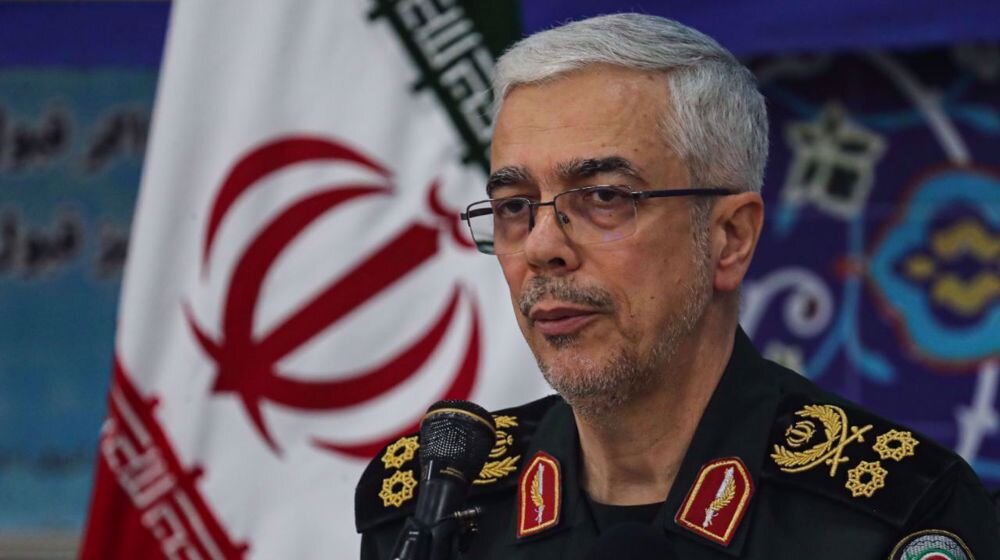Iran urges Iraq to do more for implementation of bilateral security deal

TEHRAN- Chief of Staff of the Iranian Armed Forces Major General Mohammad Baqeri said on Saturday that Iraq must do more to fully implement a security accord reached with Iran in March, and anti-Iran forces operating on Iraqi soil must be entirely disarmed under the provisions of the agreement.
General Baqeri also said that the Iraqi government has made an “important step” in implementing the security deal with Iran by relocating anti-Iran terrorists from regions near the two countries’ joint border.
However, Baqeri maintained that Iran expected “full disarmament” of those groups, and that relocation alone would not meet the agreement’s conditions.
In an address to a gathering of cadets and military officials at Iran’s Supreme National Defense University, he noted that “what sense does it make to have separatist Iranian groups based in Iraq’s Kurdistan region to commit various terrorist acts in our country so that we are forced to keep many troops on the border.”
He said that the presence of anti-Iranian terrorist groups on Iraqi soil has been verified by Iraqi officials, who agreed that the matter had to be resolved once and for all.
The remarks came about three weeks after the Iran-Iraq security deal deadline for the removal of anti-Iran terrorists from areas near the Iranian border expired.
On September 30, during an interview with Al-Arabiya, Iraq’s Minister of Interior Abdul Amir Al-Shammari said that Iraq had expelled all separatist militant groups residing near the northern borders with Iran.
Al-Shammari announced that the borders between Iran and Iraq’s Kurdistan region were completely under the control of Iraqi forces.
The remarks came after the Arab country’s interior minister announced that Baghdad is committed to its security agreements with Iran.
“We have taken necessary actions to remove terrorist groups from the Iraq-Iran border, and our constitution does not allow any side to use Iraqi soil to attack neighboring countries,” Iraq’s Foreign Minister Fuad Hussein said in September.
Iraq’s foreign minister also said that Kurdish militant groups near the border with Iran had handed over their heavy equipment as the deadline for their disarming and redeployment under a security agreement between Tehran and Baghdad finished.
The Kurdistan Regional Government (KRG) had taken the required steps in accordance with Baghdad’s agreement with Tehran.
Hussein emphasized that Iraq seeks peaceful solutions based on discussion and respect for neighbors and that Baghdad condemns any act of violence against its national sovereignty.
"An agreement has been struck between Iran and Iraq, in which Iraq has committed to disarm armed separatists and terrorist groups present in its territory, close their bases, and relocate them to other locations before the 19th of September," Iran’s Foreign Ministry spokesman Nasser Kanaani told a weekly briefing just a few days prior to the deadline.
The Nour News Agency, which is associated with Iran’s Supreme National Security Council, also reported the last month that bases belonging to the Komalah, Kurdistan Freedom Party (PAK), the Kurdistan Free Life Party (PJAK) and the Kurdistan Democratic Party (KDP) along the common border with Iran and in the other parts of the Iraqi Kurdistan region were in the process of getting dismantled.
“The terrorist groups are going to be relocated to a base deep inside the soil of the Iraqi Kurdistan region,” the outlet stated, quoting an anonymous source.
Iranian officials had warned Iraqi governments that Tehran would resort to military action if Baghdad failed to secure the borders by the end of the Iranian calendar month of Shahrivar.
In September 2022, Iran's Revolutionary Guards targeted terrorist groups in Iraqi Kurdistan, firing missiles and drones at their bases. According to local authorities, 13 terrorists died during the attacks.
On September 20, in an interview with Al-Alam TV, Tehran’s ambassador to Baghdad, Mohammad Kazem Al-e Sadeq, said that Iran and Iraq sent a joint team to the Iraqi Kurdistan region to investigate if a security deal between the two countries, which includes the removal of armed separatist groups from the northwestern borders with Iran, is being carried out.
Al-e Sadeq said both the KRG and the federal government in Baghdad were adamant about driving out terrorist separatist groups from areas close to the Iranian border and relocating them to refugee camps.
The diplomat emphasized that Iran continues its measures to disarm terrorist groups located in the KRG in compliance with the March security agreement with Iraq.
